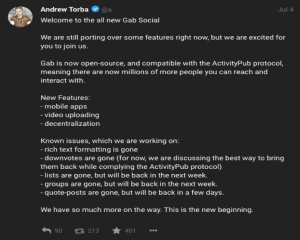Analysis: The use of open-source software by terrorists and violent extremists
Why global coding collaboration benefits everyone – including terrorists and violent extremists.
3 min read
Claudia Wagner Apr 30, 2020 6:31:12 PM
How Nordic neo-Nazis use the internet
Listen to full episode here: https://www.techagainstterrorism.fm/how-nordic-neo-nazis-use-the-internet/
In the latest episode of The Tech Against Terrorism Podcast, hosts Jacob Berntsson and Flora Deverell spoke to Jonathan Leman and Louie Dean Valencia-Garcia about Nordic neo-Nazi use of the internet and the publishing house Arktos, which is publishing some of the most influential extreme-right books and materials globally.
Jonathan is a researcher at Expo Foundation, a Stockholm-based organisation monitoring far-right activity in the Nordic countries. He is also a recipient of the Raoul Wallenberg award – a prize awarded by the Swedish Raoul Wallenberg Academy for work countering xenophobia. Louie is Assistant Professor of History at Texas State University. He is a research editor for the journal EuropeNow, the monthly journal for the Council of European Studies at Columbia University, as well as a Senior Fellow at the Centre for Analysis of the Radical Right. Read some insights from the discussion below.
***
The Nordic Resistance Movement (NRM) is a neo-Nazi organisation that was originally founded in Sweden. It was founded in 1997, when Klas Lund and other former members of the White Aryan Resistance were released from prison. They joined hands with the far-right magazine Folktribunen and members of National Youth, a neo-fascist and racist organisation, to create the Swedish Resistance Movement, which particularly targeted non-white immigration into Sweden.
In 2016, the organisation spread to form the Nordic Resistance Movement, an umbrella for neo-fascist groups with affiliates in Sweden, Norway, and Finland (an early affiliated chapter in Denmark was disbanded). Its primary policy is an immediate halt to so-called “mass” immigration, linked to the deportation of those not of northern European descent. The NRM is also openly anti-semitic and anti-gay, and advocates Nordic “self-sufficiency” and withdrawal from the EU.
The NRM has enjoyed some very minor electoral success in Sweden. In 2014, two NRM members were elected to Sweden Democrat seats on municipal councils; it then registered as a political party in its own right in 2015. However, at the general election of 2018, it failed to have any candidates elected to the Riksdag, and garnered only 0.03% of the popular vote. The Finnish arm of the NRM has been proscribed by the Supreme Court.
Disproportionate to its size, the NRM has had a significant influence on extremist movements worldwide. Members have been working within the neo-Nazi movement springing from the US and involved in the conflict in Ukraine. They and other Nordic neo-Nazi movements have exploited the internet and its technologies to communicate, spread their message, and recruit on a global scale.
The fragmentation of the white supremacist right in Sweden, after the relative disappointment of the 2018 general election, has seen individual members and sympathisers place much less emphasis on their ties to large and established groups like the NRM. Instead, they have turned to social media and other online tools to express themselves, build connections, and maintain a kind of group identity.
There is a critical duty for tech platforms to enforce their content standards around hate speech and incitement to violence, if not violent extremism. Such enforcement needs to be global. In addition, once breaches of content standards have been identified, action needs to be taken to name and prosecute serious offenders. Platform operators must be willing, within the parameters of freedoms and human rights, to cooperate with police and other authorities to allow appropriate action to be taken.
The opportunities of the internet have also facilitated the attempted rebranding of older far-right ideas such as a “new right,” taken off some of its more toxic elements. Since it was founded in 2010, publishing house Arktos gives a platform to extreme-right texts and their reach extends around the globe. “The idea of Arktos was really to find a way of communicating both in analog text, short books, and also digitally. Making a profit is not their priority,” says Louie.
Instead, Arktos’ aim is to spread their message as widely as possible. They do this in multiple ways, from modernising past fascistic ideas and making them relevant to a new audience; to translating extremist texts into different languages for better reader accessibility. Even their distribution model is couched in the desire to put popularity over profitability as they aim to sell the books as cheaply as possible and in bulk, where possible.
Arktos has been trying to draw a line between extremist writers from the past, who were trying to rebrand a far-right ideas after World War II, and then connect it with younger people in the far right movements across Europe and globally. This new right idea from the mid 20th century that had not really gained a lot of steam over the last 50 years until Arktos and started to bring those ideas and translate them for a broader audience.
The challenge for global society and the tech community is therefore to find ways to restrict as far as possible the development and propagation of violent extremism, hate speech, and harmful ideologies while maintaining the freedom of the internet. To do so, democratically elected governments have to come together to build consensus around what these elements actually are and where the parameters lie in the online sphere.
Listen to full episode here: https://www.techagainstterrorism.fm/how-nordic-neo-nazis-use-the-internet/

Why global coding collaboration benefits everyone – including terrorists and violent extremists.
At a launch event held in partnership with the Government of Canada, Tech Against Terrorism unveiled the latest developments in its Terrorist Content...
We are seeking feedback from tech companies, civil society, and academics. Deadline for submission is 23:59 (GMT) on 2 December 2019.